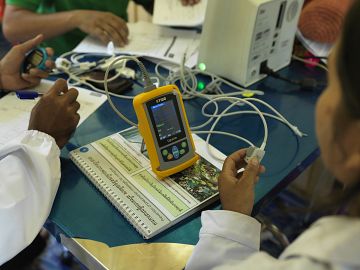Pneumonia research needs significant funding injection to accelerate ending preventable child deaths from the disease
26 February 2022
Findings from an electronic Delphi (eDelphi) research prioritisation exercise conducted by The Every Breath Counts (EBC) Research Group between November 2019 to June 2021 have today been published in The Journal of Global Health, outlining the top 20 paediatric pneumonia research priorities with the potential to accelerate reductions in child pneumonia deaths.
An estimated 672,000 children died from pneumonia in 2019, more than HIV, TB and malaria combined. Despite this, pneumonia receives only a fraction of the research funding of these other diseases. Major investments in research, implementation, health systems and advocacy are still needed to meet Sustainable Development Goal (SDG) 3.2 – to end preventable deaths of newborns and children. Given funding gaps for pneumonia, well-conducted and relevant research targeting the major barriers to further mortality reductions is urgently needed.
Every Breath Counts is the world’s first public-private partnership to support national governments to end preventable child pneumonia deaths by 2030. Malaria Consortium has been a member of EBC since it launched as well as co-chairing the research group. For this study, the research group collated an initial list of research topics that were subsequently ranked through an iterative process by 108 pneumonia experts consisting of researchers, implementers and policy makers from across the world; a final list of research priorities for childhood pneumonia in the context of the COVID-19 pandemic was then developed. The study also explored whether previous priority areas, set in 2011, had been successfully addressed.
“It’s great to now have a definitive list of pneumonia research priorities, informed by such a large group of stakeholders and we hope to work with donors and ministries of health in high burden pneumonia countries to address some of these priorities in the short to medium term.” Dr Kevin Baker, co-chair of the Every Breath Counts Research Group, and Research Adviser at Malaria Consortium.
Important differences in research priorities between high-income (HIC) and low- and middle-income (LMIC) respondents emerged, with HIC respondents prioritising focus on neonatal pneumonia, compared to a focus on vaccine and health system capacity in LMIC respondents.
There is still work to be done to build stronger links between research and implementation and research and evidence will be most effective when linked to national pneumonia action plans. As part of the work Malaria Consortium is undertaking to tackle pneumonia, the organisation is working with child health partners and the ministries of health in Ethiopia and Chad, countries where pneumonia is the leading cause of death in children under five, to develop improved pneumonia control strategies. A review of the current methods and systems used to manage pneumonia cases at different levels of the health system will be undertaken followed by the development of a Pneumonia Control Strategy (PCS) for each country.
Operational research on health system capacity, and evaluating optimised delivery of existing treatments, diagnostics and case management approaches are needed. This list should act as a catalyst for collaborative research partnerships, especially to prevent neonatal pneumonia.
To ensure that the child pneumonia research priorities identified by the EBC Research Group influence global clinicians, policy makers and research funders, the group will engage with major infectious disease research funders to make the case for increased investments against the 20 priorities, with a special focus on financing LMIC-based researchers and institutions.
Keywords: Research
Latest news
- Malaria Consortium honoured by Ugandan government for contribution to combat malaria23rd April 2024
- International summit calls for AMR accountability in public health interventions21st March 2024
- Global SMC community celebrates new milestone at SMC Alliance Annual Meeting in Nigeria6th March 2024
- Scaling up key interventions could halve pneumonia-related childhood mortality13th February 2024
- Malaria Consortium and eGov Foundation join Mozambique’s national malaria programme to digitalise seasonal malaria chemoprevention campaigns8th February 2024
- World’s first malaria vaccine rollout launched in Cameroon22nd January 2024